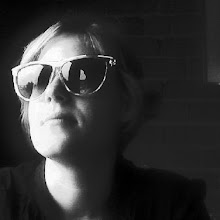A few months ago I heard an NPR story about a group of evangelical pastors who had just released an “Evangelical Manifesto” whose aim was to depoliticize the evangelical movement and reclaim the word evangelical as a purely spiritual moniker. I was amazed. Largely because of the exhaustive work of such Reagan and post-Reagan era figures as Jerry Falwell and Pat Robertson, I had always assumed that evangelicals were by definition political. I was sure that their aim was to reshape the nation into a conservative Christian bastion through a grassroots campaigning process that since the early eighties has been astonishingly successful. Well, it turns out (duh!) that evangelicals, though they share certain core beliefs about the Bible, God and Jesus Christ, are as varied a bunch as, say, atheists or Hindus or lumberjacks.
And I started thinking about why all these years I’ve regarded evangelical Christians as a monolithic entity when as a liberal man of the arts I pride myself on being curious about all peoples and cultures. The fact is that I’ve been content to live in the comfortable and judgmental bubble of a coastal, secular urbanite. Even worse, one that works in the theater, where it is assumed everyone is liberal and extremely tolerant.
But theater is supposed to be a community, a chance for artists and audiences to share moments of catharsis about our place in the world and culture we inhabit. (Sounds a bit like church, doesn’t it?) So why have so few American plays explored the very strong evangelical movement that defines so many communities in the States, if not increasingly the nation itself? The few plays that do address the subject tend to be either satirical or overtly judgmental. Why this separation of church and stage? (You know I’ve been waiting to use that one for ages.)
Which is why I’m so grateful to the wonderful New York-based theater group The Civilians for tackling the subject with such curiosity and compassion. THIS BEAUTIFUL CITY, a study of the unofficial evangelical capital of the U.S., Colorado Springs, is a documentary play with music that is performed by one of the smartest and most dynamic young companies in the country.
The Civilians, who have had several Off-Broadway hits in the last few years, do not work in a conventional script-based method. To quote their mission statement, “The Civilians is a production company that develops original projects based in the creative investigation of actual experience. Using methods that combine documentary and artistic practices, the company creates engaging shows that illuminate the interplay between the personal and larger social phenomena. The performances are boldly theatrical and rooted in a dynamic relationship to the audience, taking inspiration from the full range of theatrical forms—from cabaret to experimental theater. The Civilians works with a multidisciplinary group of Associate Artists who generate ideas and collaborate on the development of new work.” (To learn more about them, check out their website at www.thecivilians.org.)
To research this project, the company, including artistic director Steve Cosson, his co-writer Jim Lewis, five of the company’s actors and composer Michael Friedman, whom you know as the composer of BLOODY BLOODY ANDREW JACKSON, spent a 10-week residency in Colorado Springs. Over those ten weeks, the company members fanned out throughout the city and conducted interviews with a wide array of community members—from pastors at several of churches, most notably at the influential megachurch New Life, and devout congregants of all ages to the editor of an alternative newspaper and an evangelical transsexual who is trying to find ways to fit God into her life. To The Civilians’ credit, their project was always transparent. The community was always involved. In fact, in February 2007 they presented a workshop of an early draft of the play, when it was called “Save This City,” and invited all the people whom they interviewed. To everyone’s surprise, both the evangelicals in the audience and their detractors thought the play cast them in a favorable light. Everyone was equally engaged.
While The Civilians were in Colorado Springs, though, a scandal erupted at New Life that grabbed the national headlines for a few days. The founder and lead pastor of the church, Ted Haggard, was revealed to have hired the services of a male prostitute several times and to have bought crystal meth from the man and used it with him. This is the kind of event that documentarians—whether in film or the theater—live for, the moment when the theoretical they’ve been exploring becomes urgent and immediate. And as you will see in the play, the revelation allowed the company a whole new round of interviews and the chance to discover more than they’d anticipated about the community’s capacity for candor, self-examination and forgiveness.
For as much as THIS BEAUTIFUL CITY is about evangelical Christianity, it is also about a growing American community discovering to what extent it can accept change and heterogeneity. As we enter the final months of the presidential election and politicians try to convince us that America is divided by irreconcilable differences between red and blue states, U.S. citizens and illegal immigrants, the religious right and the liberal left, I’m delighted you’ll have a chance to spend some time in Colorado Springs as experienced and brought to life by The Civilians.
To hear the NPR “Day to Day” segment about the Evangelical Manifesto, click here.
Thank you.
Pier Carlo Talenti
Resident Dramaturg / Literary Manager
Hello world!
-
Welcome to WordPress. This is your first post. Edit or delete it, then
start writing!
3 years ago

No comments:
Post a Comment